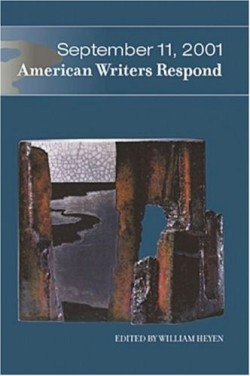September 11, 2001
American Writers Respond
A letter written to an ex-lover three days after the heart has been broken packs more punch than a letter written fifteen years later. Like such a letter, this book features sentiments brash, angered, wounded, disbelieving, and powerful.
The editor, a professor at SUNY Brockport and former Fulbright lecturer, originally submitted this book’s proposal, accruing over 120 writers who would “cut to the quick of their thinking on the origins and implications of the grief and anger and dread now engulfing us,” only to withdraw it the following day. One gets a sense that the man has grappled with responding to 9/11 from several different angles: cautioning himself against “optimistic over-reaction,” deeply questioning “who has the right at such a time to say anything at all,” and examining the grave consequences of “blind patriotism.”
So too have his contributors, and their perspectives range fiercely. Reflecting this collection’s intention is the core idea of former Poet Laureate Robert Pinsky’s essay, “Enormity and the Human Voice.” Pinsky asks the question, “why have so many readers turned toward poetry in response to this calamity?” and one could broaden the inquiry to read “why turn to writers?” He believes that the poem “can provide vocal intimacy: a human scale of emotion and understanding,” and includes several poem excerpts that have helped him in comfort and clarity.
Some writers map out historical and future connections on a time line as if a compass’s point was poised on 9/11, and the circles of implication swell in both directions. Joy Harjo writes a poem that takes on an “It was coming” attitude. “We had been watching since the eve of the missionaries in their long and solemn clothes, to see what would happen.” Wendell Berry’s outstanding essay, “Thoughts in the Presence of Fear,” includes twenty-seven political, economical, environmental, and technological considerations that serve as a guide to the pre-cursing conditions of 9/11, and ways in which change can prevent its reoccurrence. Daniela Gioseffi sheds fascinating historical light, all the while scrutinizing the American people’s collective ignorance on their country’s foreign policy.
Speechlessness also pervades. Consider Maxine Hong Kingston’s inclusion: “While I just cannot write a new response, I can offer notes for the memorial service I helped give at U.C. Berkeley.” Others take on Michigan writer Al Hellus’s frame of mind: “I find myself with nothing else quite as elegant and articulate to say than: Fuck Them. And I mean that from the bottom of my broken heart.”
These introspective journal entries, poems, essays, correspondences, and abstracts represent America’s voices, adhering Pinsky’s “vocal intimacies” to a collective experience. In fifteen years a “September 11 Volume Two” would make a powerful follow-up, if for no other reason than to witness the evolution of a broken heart.
Disclosure: This article is not an endorsement, but a review. The publisher of this book provided free copies of the book to have their book reviewed by a professional reviewer. No fee was paid by the publisher for this review. Foreword Reviews only recommends books that we love. Foreword Magazine, Inc. is disclosing this in accordance with the Federal Trade Commission’s 16 CFR, Part 255.

